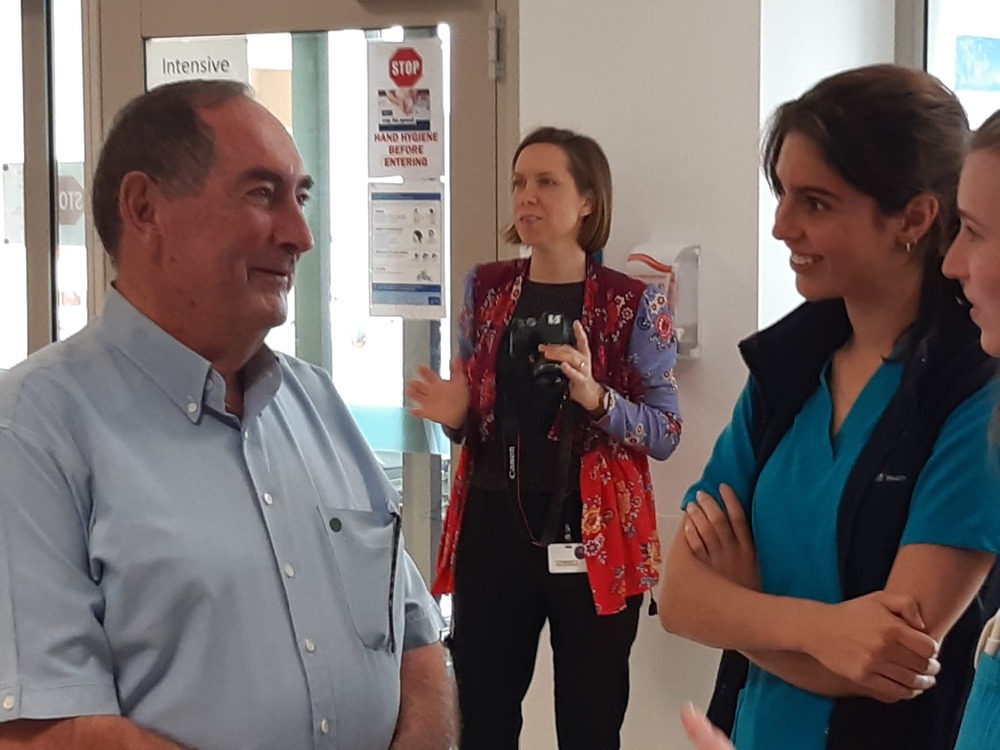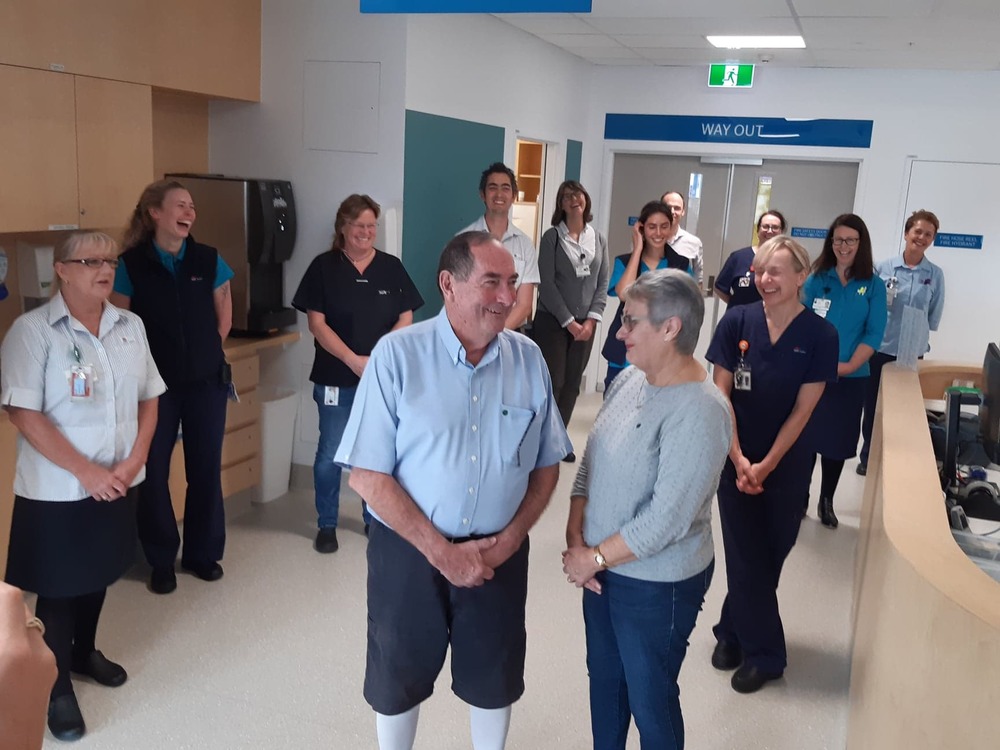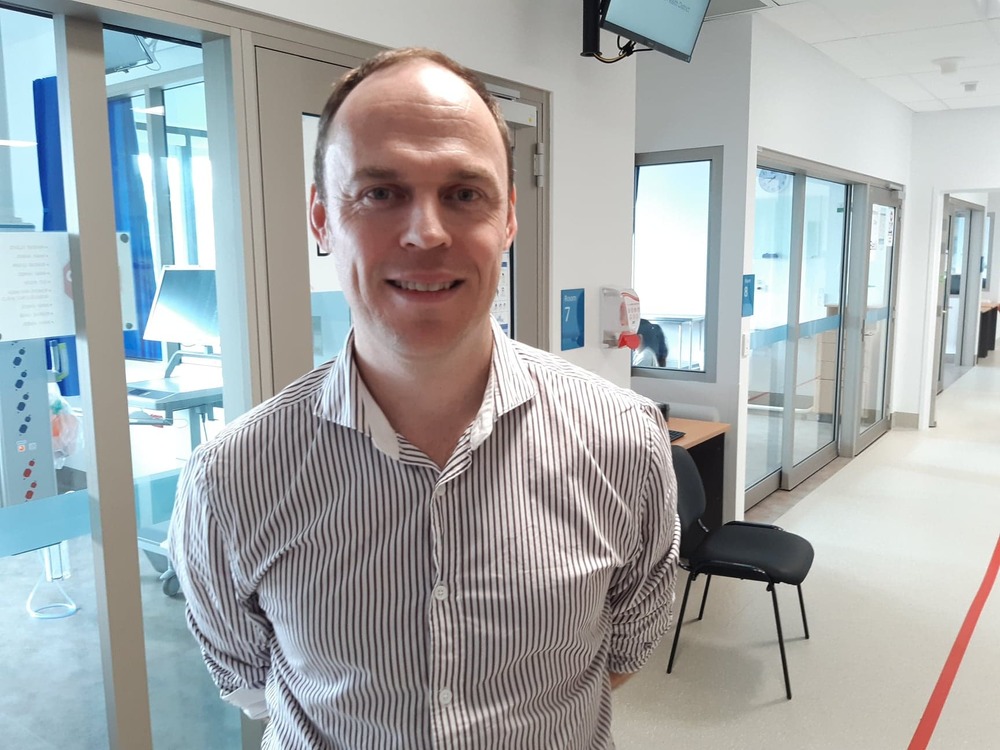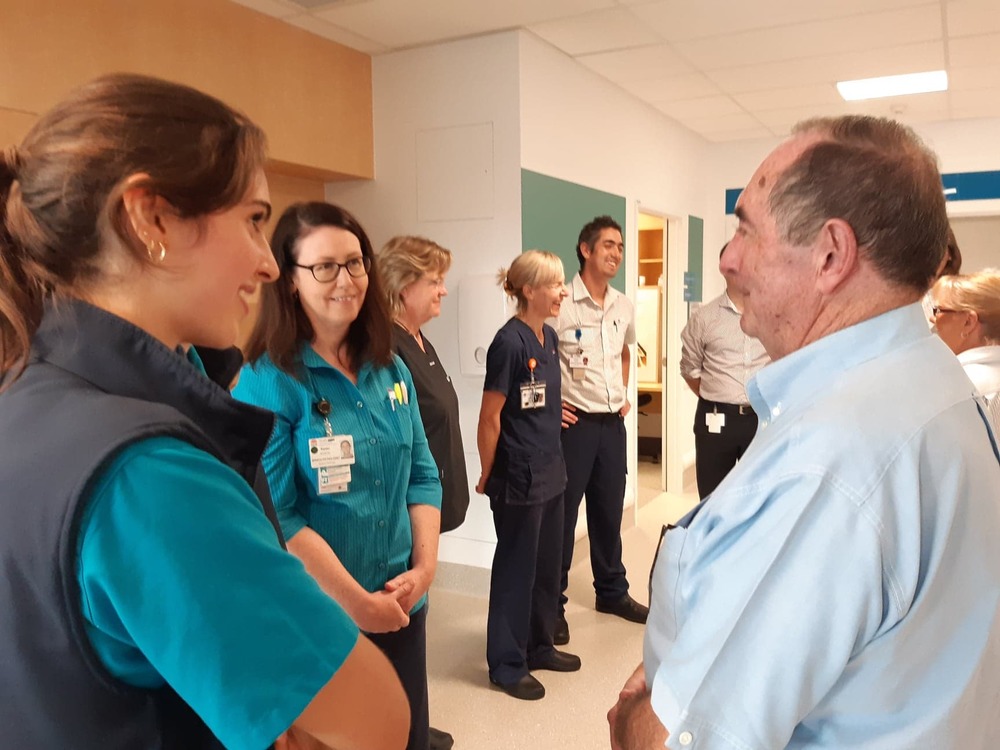From scratchy throat to ICU: Covid survivor returns to base
Liina Flynn
16 June 2020, 5:47 AM
 Warren and Julie Ainsworth with Lismore Base Hospital ICU and Ward E10 staff.
Warren and Julie Ainsworth with Lismore Base Hospital ICU and Ward E10 staff.What started as a scratchy throat for Warren Ainsworth turned into 35 days in Lismore Base Hospital being treated for Covid-19 – much of which he doesn’t remember.
Warren had hallucinations and was in a coma in the hospital’s Intensive Care Unit (ICU) for 14 days of his stay, where he was under the close attention of nursing staff and attending physician Joe Duncan.
Today, the Casino resident returned to the hospital’s ICU, along with his wife Julie, to thank the medical staff who cared for him and kept him alive through the fight for his life.
Warren said it was only a few days after he returned from an overseas trip to the UK with his wife Julie that he came down with a scratchy throat. He believes he could have caught Covid-19 from London’s Heathrow Airport.
“It was before we had the Covid lockdowns,” Warren said, “At Singapore airport, they were wearing masks and taking temperatures, but not at Heathrow.”
Deteriorated
Warren said it wasn’t until day 14 of displaying symptoms that his condition severely deteriorated.
“We made it back on the Wednesday to Casino, then I had the tickle in the throat on Friday,” he said.
“I still have the same tickle in my throat.
“My family pushed me to get tested, or I wouldn’t have done much about it – and it was on the 14th day I got really crook.
“Julie and I both went to the fever clinic on the Saturday and by Monday I got the message I was positive, but Julie was ok.
“The clinic straight away wanted to check my temperatures and by the next Friday, I was back at the clinic because my temperature was going off and I had a little bit of diarrhea.
“On the Monday, the doctor arrived at my house and I still didn’t feel I was sick.
“I asked the doctor ‘how did you pick it up?’ and he said you have the symptoms – then he called the ambulance.

Downhill
After Warren’s initial hospital admission, his attending physician, Joe Duncan said when Warren’s condition deteriorated, "his respiratory rate became high and his oxygen was getting low".
“We [the medical team] had a meeting and decided he needed to go to intensive care,” Joe said.
Warren said "I stared going downhill and don’t remember even going into the hospital room".
Then he spent 14 days in ICU, with 11 days on a ventilator.
“I remember waking up really still and thinking ‘what’s going on?’,” he said. “I don’t remember being sick and I was being told I was a very lucky man.
“I can’t thank them enough in ICU. Whatever they were doing, it was working.
“It took four days to get all the wires off me and everybody thought I was well enough to come downstairs.
“I thought I was going to a general ward, but I was going to isolation.”
It was there that Warren has physiotherapists work with him until he was able to begin to move again.

Isolation
Warren said it was hard not being able to hug his loved ones.
While he was in ICU, the nurses pushed his bed closer to the glass so he could be closer to his wife when she visited.
“My wife could only come to the door,” Warren said. “When the nurses and doctors came into the room, they were in the full protective gear and it was hard to tell who they were.
“It was surreal and an awakening for me. It hit me then and I wondered what was happening to my family.
“I saw later my son had written a long tear-jerking letter to the hospital – I didn’t even think about the other people involved -my family and what they were going through and the doctors feeding information back to them.”
Read the Lismore App’s earlier story and Warren's son's letter: Family sees first hand how Lismore Base Hospital staff treat COVID-19
Getting better
“As I was getting better, I was wearing my own casual clothes and they started piled up in the room and a nurse said ‘we can’t take them out’," Warren said.
“It wasn’t until they were double bagged that my wife was allowed to take them home and wash them.”
Since his release from hospital, Warren has been slowly recovering at home with the help of Hospital at Home, where his condition is monitored through phone calls and visits from medical staff.
Today, he is in good spirits, smiling and cracking jokes with the hospital staff and says he “can’t thank them enough”.
“I don’t have fond memories of being here - the last time I went out of here, I was on a stretcher,” Warren said.
“Coming back in today and looking around the room at the staff here, I think ‘thank heavens they are here’.
“Now I know I’ve had the virus, I believe I was very lucky that we have the hospital service here and the NSW Health Department.”
In the future, warren is looking forward to going up to Brisbane to visit family once the State borders open up on July 10.
His message to other people is to get tested early and don’t wait.
“Pick where you choose to travel to carefully and get travel insurance,” he said.

Warren's attending physician Joe Duncan.
New disease
Warren’s attending physician at Lismore Base was doctor Joe Duncan - and he coordinated Warren’s the care with the other medical staff, including Hospital at Home doctor, Dr Brian Hughes.
Joe said deciding on a course of treatment with such a new disease was tricky and doctors needed to make decisions based on what they thought was best for the patient.
“With such a new disease, the evidence that’s published and the literature out there is unreliable," he said.
“We know this virus causes inflammation in the lungs. It destroys the lungs and it takes a long time for the inflammatory syndrome to settle down.
“There’s no treatment for Covid-19, so we just support and make sure there’s enough oxygen and wait for the body to fight the disease off and recover.

Long recovery
Jo said some people can take a long time to recover from Covid-19.
“There’s a great variability in the presentations and how people respond to the virus, from people who don’t have any symptoms at all - to those who have lifelong damage to their lungs and brains,” he said.
“We don’t fully understand what the virus does to people. We know it is a full range of things that can affect people lifelong.”
Message to young people
“Whilst in young people, the severity of the virus is generally less, we have case reports from around the world of people dying of all ages,” Joe said.
“It does not exclude young people – they are at risk too and because they have a lot of good years of life left, we don’t want them to get complacent and get a virus where we don’t know how they will respond to it.
“It’s a bit of a lotto.
“You just need to keep up to date with what’s happening locally and keep socially distancing.
“Hopefully, we can beat it.”


